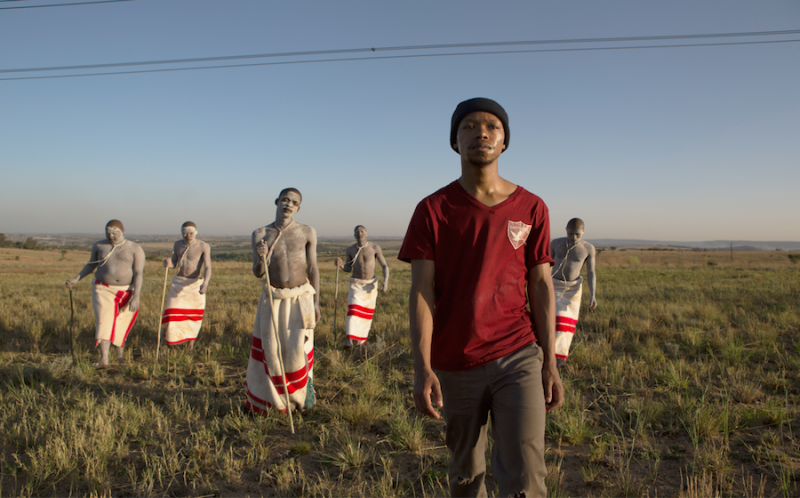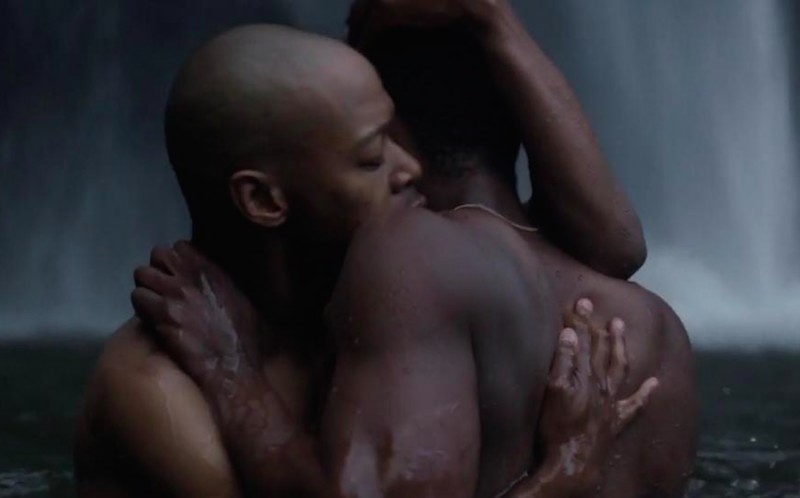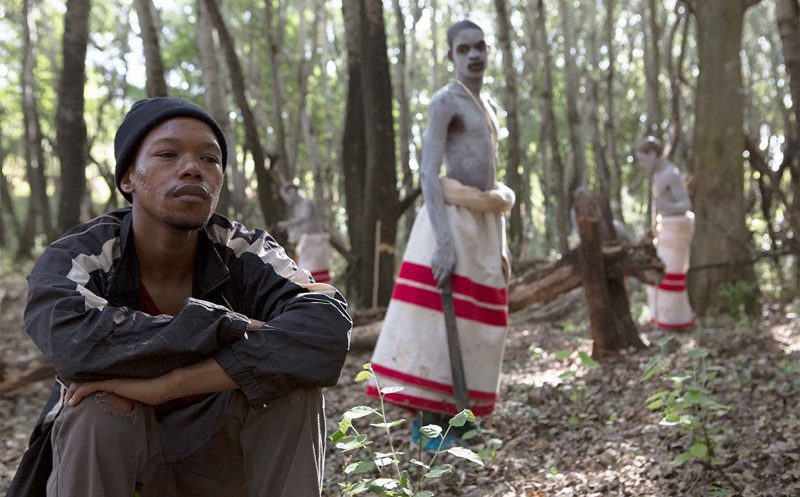The Wound (Inxeba) was South Africa's Oscar entry for Best Foreign Language Film that made the December shortlist, but ultimately missed out on being nominated. That's an absolute travesty.

The film is a raw and honest exploration of masculinity, depicting the struggle of balancing cultural and queer identities in the context of a Xhosa coming of age ritual. Though received well in certain spaces, the film has faced a lot of push-back from traditionalists in South Africa, and it is currently emboiled in a legal battle to retract the X18 'pornography' rating applied to it.
We caught up with the co-writer and director John Trengove, and the absolutely captivating lead Nakhane Touré, about whether they knew that this was the sort of film that would change the conversation when they were making it.
"God no," said Trengove. "I mean, in writing it and thinking about it, we certainly understood that we were moving into potentially triggering and complex terrain, and we knew where the reactions would come from. What we didn’t know was the extent of the reactions."
"There’s such a disconnect between the film and this conversation about pornography,” he continued. “It’s not even about the film or what it’s showing any more - it’s actually about power structures and pressures coming form invisible sources, and suddenly you’ve got a committee deciding it’s pornography. And not even being able to justify it. It points more to an irrational neurosis that sits at the base of these different power structures.”
“And a very interesting moralism as well,” Nakhane adds. An openly queer Xhosa musician who writes and sings about his own identity, this seems distinctly personal to him. “Slapping it with the label of pornography also says that pornography is something to be ashamed of. That people should have a certain idea of moral values, and one of those things is that they should not watch pornography. They want to sully and mar this film’s reputation by calling it pornography, and there’s nothing worse than that! It’s very conservative.”
“Suddenly it wasn’t about what the film was,” Trengove said, “it was about everything else. It was about freedom of speech, what we’re saying as artists, how we define pornography, this puritanical aspect that suddenly emerged. So suddenly there was all of this noise, and it felt like the film was getting lost somewhere in it.
“The film being as critical of queer culture as much as it is of conservative culture - this is a conversation that is only beginning now to emerge. It got drowned out. I don’t know if it’s a bad thing necessarily - again we come back to this idea that we knew what film we were making. We knew what buttons we were pressing.
“And there’s a positive side to it - the sheer noise then amplified the idea of the film, and it started reaching people that wouldn't otherwise have seen it. Mostly through piracy, but it was amazing. You would see these illegal links appear online, and within a day or two there were hundreds and thousands of views. Just astonishing. People were so interested in the film. So arguably we potentially reached a queer audience in remote parts of the country that would never otherwise have seen the film, and that has to be some kind of moral victory.”
Nakhane laughed, adding, “I remember being called by relatives I hadn’t spoken to in years, going “Are you okay?” I sort of pooh-poohed the whole thing, but I remember thinking, if so-and-so is calling me, I guess it’s gone really far out. As much as I was concerned, I also felt really happy that there was a kid out there who knows that this is happening.” The concern came from graphic death threats he received in response to the film, that he seemed remarkably blasé about.
As well as backlash from conservative groups, there has also been a surprising response from queer audiences around the world. “We had a few screenings with largely middle aged white gay men in America, and that was one of the toughest crowds,” explained Trengove. “This is a community who in their lifetime fought for gay liberation, and so there’s a sense of betrayal by the end of the film.”
“And that was absolutely the intention. With myself as an outsider to this culture, I also felt that if I was going to so this, I would face a lot of backlash, and legitimate criticism, but for that reason it was important to try and challenge my own sensibilities as much as possible.”
Without spoiling what the ending is, Trengove said, “I think that when that ending presented itself, something clicked for me. I though oh my god, of every other possible ending that we’ve considered, there is nothing that is as interesting as this. So from that day onwards it became a process of finding a connection between that resolution and what the film as.
“I think what that moment does for me is to put all of it back in the audience’s lap, and say “Do you think you know what is right for these people?” Something of the complacency of the audience is shaken up in that moment, and you’re asked to interrogate something about your own world view. And some people at that point just cannot deal with it, and reject it, and other people go there. But that’s the film that we chose to make.”
“You think you have an idea of who he is,” added Nakhane. “You think you understand what could be good for him - and these are all privileged thoughts. But then [the ending] forces you to question your own preconceptions of what is right for people in different spaces from you.”
On the matter of representation that’s at the forefront of the film industry at the moment, Trengove said, “If you absolutely hate it, if you’re a young queer kid and you go “This is not my experience,” maybe that’s a moment where you can think about telling your own story. Just to start something would maybe be the best possible outcome of this film.”
Nakhane added “Sometimes people who are modernised can tend to insist that there can only be one: one representation. Cardi B or Nicki Minaj - can’t you have both?! Rihanna or Beyonce - they’re incredibly different! That’s what I really hope this film shows.”
On comparison The Wound has garnered with Moonlight (2015), Nathan exclaimed “Where?! Where are the similarities?”
“That’s because of scarcity. Because there is no other precedent,” continued Trengove.
“How many heterosexual stories - kissing in the rain - have we watched?! I’m tired of them,” said Nakhane. Aren’t we all?!
The Wound is released in select UK cinemas and on demand tomorrow, distributed by Peccadillo Pictures.
https://youtu.be/kSVTWd8fCuM